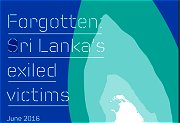 by International Truth & Justice Project: Sri Lanka, South Africa, June 10, 2016
by International Truth & Justice Project: Sri Lanka, South Africa, June 10, 2016
Exiled Tamil victims of war crimes and torture say they would testify by video to a special court in Sri Lanka only if international judges were involved and their identities protected, says a new study.
This is a consultation exercise that has focused on survivors of the conflict in Sri Lanka that ended in May 2009 and the post-conflict period. It is not a diaspora consultation although there is definitely a need to conduct such an exercise. These recent arrivals are not integrated into the Tamil communities abroad; indeed several fear mixing with other Tamils because they are sexual violence survivors or have family still in the north east of Sri Lanka facing continued harassment. These victims live in limbo, neither rooted in their country of exile nor at home in their own country. Their experience of the final and most bloody phase of the war sets them apart from other members of the Tamil diaspora who came after the 1983 antiTamil pogrom, for example, and are now well established in their new countries…
The ITJP decided to conduct these consultations in accordance with the OHCHR Rule of Law Tools for PostConflict States, National consultations on transitional justice1 , with exiled victims as this consultation exercise may well be the only opportunity for them to have a voice in determining the future of their country. The consultation has provided an opportunity to these victims to speak about the horror they witnessed during the war and during the post-conflict period. It also incorporates their views on future transitional justice mechanisms. To our knowledge, this is only the third time that such a consultation process has been conducted outside a country2 .
ITJP now has the largest archive of witness testimony and other evidence outside Sri Lanka pertaining to the final phase of the conflict and post-war torture and sexual violence.